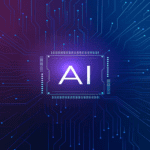Artificial Intelligence has become a huge part of the daily lives of people and is a branch of science that is focused on stimulating human intelligence using machines. AI has become essential in almost every industry in the world today from sports, construction to education. Significantly, the advent of AI in education and learning has brought a completely new approach to the learning method.
The digital education market or the e-learning market as it is commonly known, is growing exponentially because of AI development. From online digital courses to virtual classrooms, Artificial Intelligence in the education sector has revolutionised conventional methods of learning. The EdTech industry with its immersive learning approach and business ideas have been adopting AI technology with significant benefits.
The following blog will help you understand about application of AI in Education sector. Before you divulge into learning about use of Artificial Intelligence in Teaching and Learning, here are some statistics that you need to be aware of:
- More than 50% of the schools and universities today rely on AI for assistance in administrative purposes for ensuring improved quality of education.
- The rapidly growing student engagement in the EdTech industry’s courses and lectures is leading the AI education market to grow by 20 Billion USD by 2027. (source)
- In India, according to the reports of State of the Education 2022, AI will grow at the rate of 20.2% compound annual growth rate (CAGR).
- The AI market in India henceforth is supposed to reach US7.8 billion by 2025 from US$3.1 billion in 2020.
- Experts have further predicted that by 2030 the rise in jobs related to AI-based Data Science and Mathematical science, will grow by 31.4%. (source)
Importance of AI in Education:
Artificial intelligence offers a cost-effective and scalable method of ensuring the integrity of internet-based test system evaluations. The application of artificial intelligence (AI) can minimise or even remove the need for physical supervisors/inspectors, rendering implementation considerably more scalable. Such instances are immediately highlighted with AI-powered online monitoring.
Warns can frequently be mechanised as well. This makes the system somewhat dependable for administering highly competitive tests without the hassle and danger that comes with travelling to a testing centre. With powered by artificial intelligence remote proctoring, one may safely administer assessments via the internet to faraway users.
Top 10 Applications and Benefits of AI in Education:
The role of AI in education seems to be quite encouraging and has enabled teachers to acquire numerous benefits by taking over time-consuming tasks, grading reports, maintaining AI classrooms, etc. Let’s have a detailed overview of some of the top AI in education examples.
1. Personalised Learning
AI in the education has enabled every student to find the best ways to learn and study their curriculum. The personalised learning approach of educational software has been supporting individuals in the best possible ways. Effectively, with Machine Learning imparted in education system backing up the way student perceives every lesson has minimised the burden altogether. The merging of AI and education focuses on the requirements of every student based on the features such as AI-embedded games, customised programs and other aspects for effective learning.
2. Task Automation
AI in schools and virtual classrooms automates nearly every one of the value-added jobs. Along with customising the teaching process, AI software systems can check tasks, grade tests, organise research pacers, maintain reports, and generate presentations and notes, along with other administrative duties. Thus, automating everyday activities using AI has been making the learning environment more productive.
3. Smart Content Creation
Artificial intelligence and machine learning are also able to help teachers and researchers with creating fresh knowledge for easier teaching and learning. Here are some examples of AI-powered content creation:
- Visualisation of data
Where conventional methods of instruction, with the possible exception of lab tries, are unable to offer visual aspects, AI smart producing material increases the real-world relevance of visualised online communication educational settings. The technology aids in 2D-3D visualisation, enabling pupils to interpret the data in several ways.
- Creating digital lessons
AI education can facilitate bit-size education by utilising low-storage study materials and other digital lessons. In this way, students and professionals can use the entire content for research while taking up much computer space. Furthermore, these materials will be accessible from any mobile device, removing the need for distance learning.
- Frequent Content Updates
AI additionally allows users to add and update data often in order to maintain the educational materials up to current all through time. Users are additionally notified when new information becomes available, which helps them plan for impending activities.
4. Adaptable Access
With artificial intelligence in the educational business, substance may now be made accessible to a global audience. According to a current poll, more than 60% of education enterprises rely on AI/ML-based educational app development aided by modern tools and features. Multilingual assistance, for example, assists in translating information into different languages, making it less difficult for every native to teach and understand.
5. Identifying classroom weaknesses
One of the greatest artificial intelligence advantages in educational institutions is the capacity to reduce the environmental impact that we have via distance learning. Many experts, however, feel that AI will soon replace human touch in education. This may be true for other sectors as well, but it is not true for education. AI and education go together, complementing both manual and virtual instruction.
Read Blog: Where AI is headed in the next 5 years?
6. Bridging the skill gap
Training students is a vital answer for firms that continue to contend with a technological divide. AI and ML-powered development of apps and software solutions make upskilling opportunities broadly accessible and reasonably priced for students. Upskilling and teaching the company’s current employees may improve enthusiasm and generate an organization-wide dedication to growth and creative thinking.
7. Customised Data-based Feedback
When it comes to developing educational experiences, whether in the business or the classroom, feedback is important. The primary distinction among good teaching and just distributing material is that successful instruction requires continuous input. It is critical that feedback originate from an trustworthy source; thus, AI in schools analyses and decides work reports based on facts from the real world. A data-driven feedback system increases happiness among learners, removes bias in learning, and helps with identifying where abilities are weak. This feedback has been customised based on the accomplishments of every pupil and employee as recorded in the system’s records.
8. Conversational AI with 24*7 Assistance
Chatbots are a prevalent instance of how AI in education consume data to inform itself while offering appropriate support. This is advantageous for both business individuals and teachers in terms of user engagement in customised learning. Conversational AI systems additionally offer intelligent instructing by closely monitoring content consumer habits and responding to their specifications accordingly. According to projections from the industry, global eLearning will continue to grow at a compound annual expansion rate of 9.1% by 2026.
9. Secure and Decentralised Learning Systems
The educational sector is producing swift AI advances but is frequently hindered by worries such as privacy of information, configurable data accessibility, obsolete accreditation methods, and so on. Despite these challenges, based on artificial intelligence decentralised systems have the potential to bring a good revolution in technology to the educational sector.
10. AI in Examinations
Artificial intelligence software remedies can be actively employed in exams and interview to detect suspect behaviour and notify the supervisor. The AI programmes monitor each person utilising web microphones, cameras, and browsers for the internet, and they conduct keystroke analysis in which any activity alarms the software. This education AI technology benefit has been shown that it’s one of the most effective online evaluation alternatives.
Read Blog: How to become an AI Architect?
Conclusion
Thus, incorporation of AI in education can be considered as one of the most significant developments of technologies that helped in improving the learning system completely. Artificial Intelligence in Education in India has been able to enhance the process of learning approach enabling students to take up different courses online and enjoy their process of study. While AI is expanding in different sectors whether AI in Retail, Pattern Matching or AI in the Construction Industry, its applications can be considered quite beneficial for any industry that incorporates it.
FAQs
What is the role of AI in the Education Sector?
AI in the education sector has been transforming the learning experiences by performing different roles. It includes producing smart content, contributing to task automation, ensuring universal access to education, providing 24*7 assistance and customising information for every student.
How can AI solve education problems?
AI helps in solving challenges of modern education such as closing technology gap between the students and teachers, keeps learning system ethical and transparent and allows remote learning.











